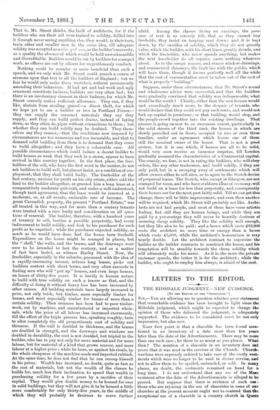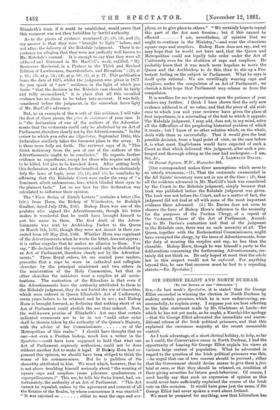LETTERS TO THE EDITOR.
THE RIDSDALE JUDGMENT.—NEW EVIDENCE.
[To THE EDITOR OF THE " SPECTATOR.") SIR,—You are allowing me to question whether your statement that remarkable evidence has been brought to light since the Ridsdale judgment, which might be expected to change the opinion of those who delivered the judgment, is adequately supported. The evidence to be considered must be not only impressive, but also new.
Your first point is that a chasuble has been found men- tioned in an inventory of a date more than ten years later than the date of the Advertisements. There may be more than one such case ; let there be as many as you please. What then ? The mention of a chasuble in an inventory does net prove that it was used in the services of the Church. Chun*. wardens were expressly ordered to take care of the costly vest- ments which were no longer to be used in divine service, and not to allow them to be spoiled, embezzled, or sold. In may places, no doubt, the vestments remained on hand for a long time. I do not understand that any use of the Mass vestment after the date of the Advertisements is alleged to be proved. But suppose that there is evidence of such flee: those who are rejoicing in the use of chasubles in some of our churches at the present moment ought not to contend that the exceptional use of a chasuble in a country church in Queen
Elizabeth's time, if it could be established, would prove that this vestment was not then forbidden by lawful authority.
As to the pieces of evidence numbered (2), (3), (4), and (5), my answer is that they were "brought to light" before, and not after, the delivery of the Ridsdale judgment. There is no pretence for alleging that they were not perfectly well known to Mr. Ridsdale's counsel. It is enough to say that they were all adduced and discussed in Mr. MacColl's work, entitled, "My Reviewers Reviewed, in a Preface to the Third and Revised Edition of Lawlessness, Sacerdotalism, and Ritualism "; (2), at p. 25; (3), at p. 54; (4), at p. 69; (5), at p. 71. This publication bears the date of 1875, whilst the judgment was given in 1877. As you speak of " new " evidence, in the light of which you desire "that the decision in the Ridsdale case should be fairly and fully reconsidered," it is plain that all this so-called evidence has no claim to be taken into account. It was fully considered before the judgment, in the somewhat fierce light of Mr. MacColl's advocacy.
But, as an example of the worth of this evidence, I will take the first of these pieces, the piece tie reeistance of your case. It is "the declaration of one of the authors of the Advertise- ments that the vestments could only be abolished by an Act of Parliament, therefore clearly not by the Advertisements." In the review to which you refer me (Spectator, September 10th), this declaration similarly takes the foremost place in the array. It is there more fully set forth. The reviewer says of it, "This direct testimony from the pen of one of the authors of the Advertisements ought to be conclusive." He regards further evidence as superfluous, except for those who require not only to be killed, but also to be knocked down. After setting forth this declaration, and also, for the benefit of those who obstinately defy the laws of logic, your (3), (4), and (5), he concludes by affirming that the Ridsdale Court were under the sway of "a dominant, albeit unConscions, bias, which blinded their eyes to the plainest facts." Let us see how far this declaration was calculated to influence their opinion.
The "First Series of Zurich Letters" contains a letter (No. lxiv.) from Horn, the Bishop of Winchester, to Rodolph Gnalter, dated July 17th, 1565. Bishop Horn was one of the prelates who signed the Advertisements, though his letter makes it wonderful that be could have brought himself to put his name to them. The first draft of the Adver- tisements was sent by Archbishop Parker to the Queen on March 8th, 1565, though they were not issued in their cor- rected form till May 21st, 1566. Whether Horn was cognizant of the Advertisements when he wrote the letter, does not appear ; it is rather singular that he makes no allusion to them. You say," He declared that the vestments could only be abolished by an Act of Parliament, therefore clearly not by the Advertise- ments." These Royal orders, let me remind your readers, prescribe that a cope be worn in cathedral and collegiate churches by the principal ministrant and two others in the ministration of the Holy Communion, but that in other churches the ministers wear a surplice at all minis- trations. The contention of the Ritualists is that even if the Advertisements have the authority attributed to them in the Ridsdale judgment, they do not forbid the use of chasubles, which were ordered in Queen Elizabeth's Act of Uniformity, seven years before, to be retained and be in use ; and Bishop Horn is brought forward, as declaring that nothing short of an Act of Parliament could abolish the use thus ordered. Now, the well-known proviso of Elizabeth's Act says that certain indicated ornaments are to be in use "until other order shall be therein taken by the authority of the Queen's Majesty, with the advice of her Commissioners or of the Metropolitan of this realm." I should have thought that no one—not even a Puritan bishop, much less a writer in the Spectator—could have been supposed to hold that what one Act of Parliament expressly authorizes, could not be done without another Act to make it legal. If Bishop Horn had ex- pressed this opinion, we should have been obliged to think the worse of his common-sense. But he is guiltless of the absurdity attributed to him. We must admit, however, that he is not above troubling himself seriously about "the wearing of square caps and surplices (usns pileorum quadratorum et superpelliceorum.)" This use, he tells his Swiss friend, had, un- fortunately, the authority of an Act of Parliament. "This At cannot be repealed, unless by the agreement and consent of all the Estates of the Realm, by whose concurrence it was enacted."
-" It was enjoined us either to wear the caps and sur- plices, or to give place to others." "We certainly hope to repeal this part of the Act next Session ; but if this cannot be effected I am, nevertheless, of opinion that we ought to continue in the Ministry,"—and wear the obnoxious square caps and surplices. Bishop Horn does not say, and we may hope that he would not have said, that the Queen and Metropolitan could not legally take order under the Act of Uniformity even for the abolition of caps and surplices. He probably knew that it was much more hopeless to move the Queen and the Archbishop to do this, than to stir up a Pro- testant feeling on the subject in Parliament. What he says is itself quite rational : We are unwillingly wearing caps and surplices, under the compulsion of an Act of Parliament ; we cherish a faint hope that Parliament may release us from the compulsion.
It is needless for me to experiment upon the patience of your readers any further. I think I have shown that the only new evidence adduced is of no value, and that the piece of old evid- ence to which you and your reviewer have given the place of first importance, is a misreading of the text to which it appeals. The Ridsdale judgment, I may add, does not, to my mind, solve all the difficulties of the perplexing historical problem of which it treats ; but I know of no other solution which, on the whole, deals with them so successfully. That it would give the best possible decision, from a legal point of view, on the case before it, is what most Englishmen would have expected of such a Court as that which delivered this judgment, after such a pro- longed and thorough sifting as the case had undergone.—I am,
Sir, &c., J. LI.EWELTN DAVIES. 34 Dorset Square, N. TV., November 8th.
[Our correspondent makes three assumptions which seem to us utterly erroneous,—(1), That the vestments enumerated in the All Saints' inventory were not in use at the time ; (2), that all the evidence advanced in Mr. IlifacColl's book was considered by the Court in the Ridsdale judgment, simply because that book was published before the Ridsdale judgment was given. The book was not before the Court, and as a matter of fact, the judgment did not deal at all with some of the most important evidence there advanced. (3.) Mr. Davies does not seem to observe the force of Bishop Horn's reference to the necessity for the purposes of the Puritan Clergy, of a repeal of the Vestment Clause of the Act of Parliament. Accord- ing to Mr. Davies's contention and that of the judgment in the Ridsdale case, there was no such necessity at all. The Queen, together with the Ecclesiastical Commissioners, might have exempted the clergy, by the issue of Advertisements, from the duty of wearing the surplice and cap, no less than the chasuble. Bishop Horn, though he was himself a party to the deliberations concerning the forthcoming Advertisements, cer- tainly did not think so. He only hoped at most that the whole law in this respect would not be enforced. For anything beyond this, he saw that recourse must be had to a repealing statute.—En. Spectator.]



































 Previous page
Previous page